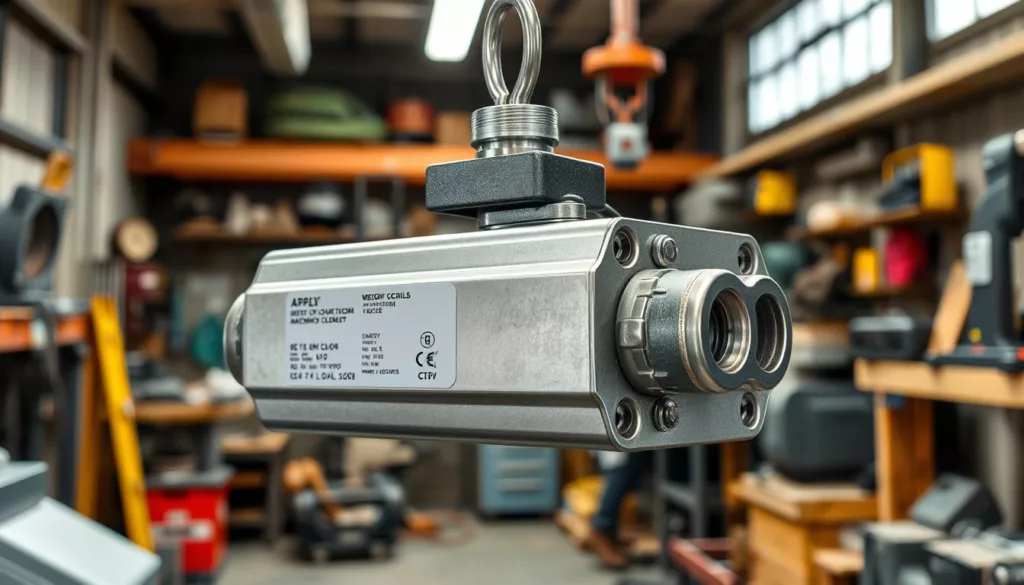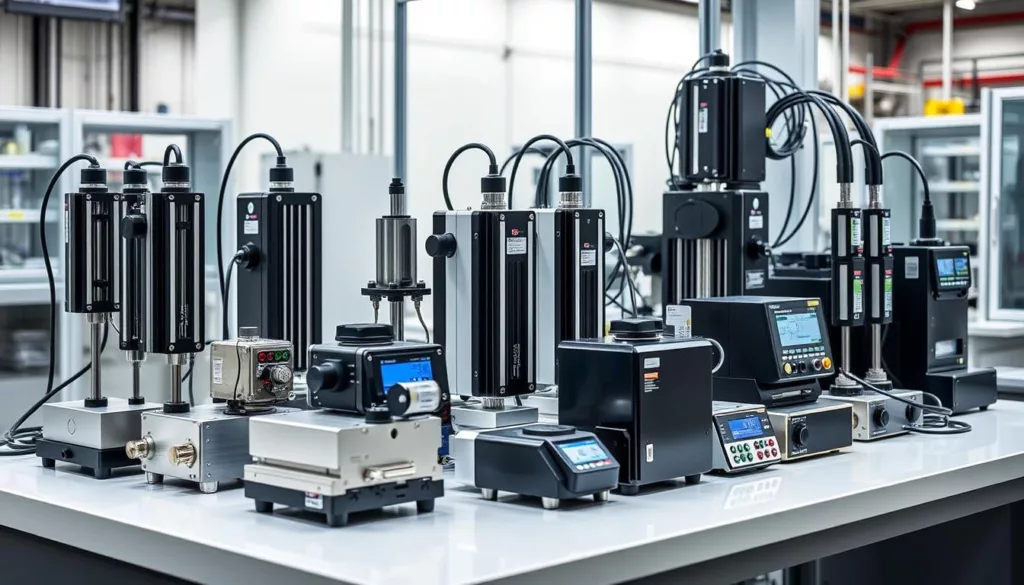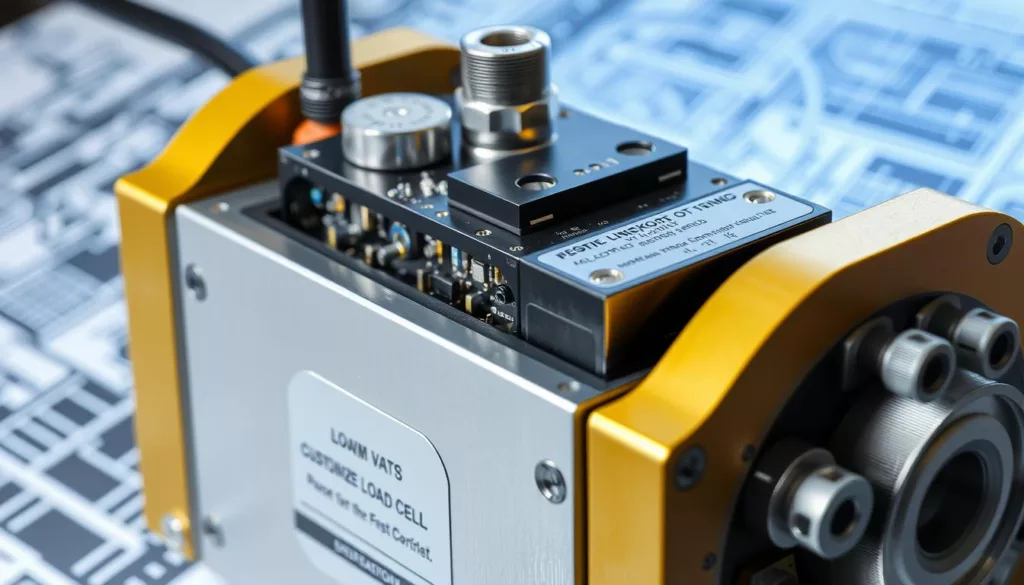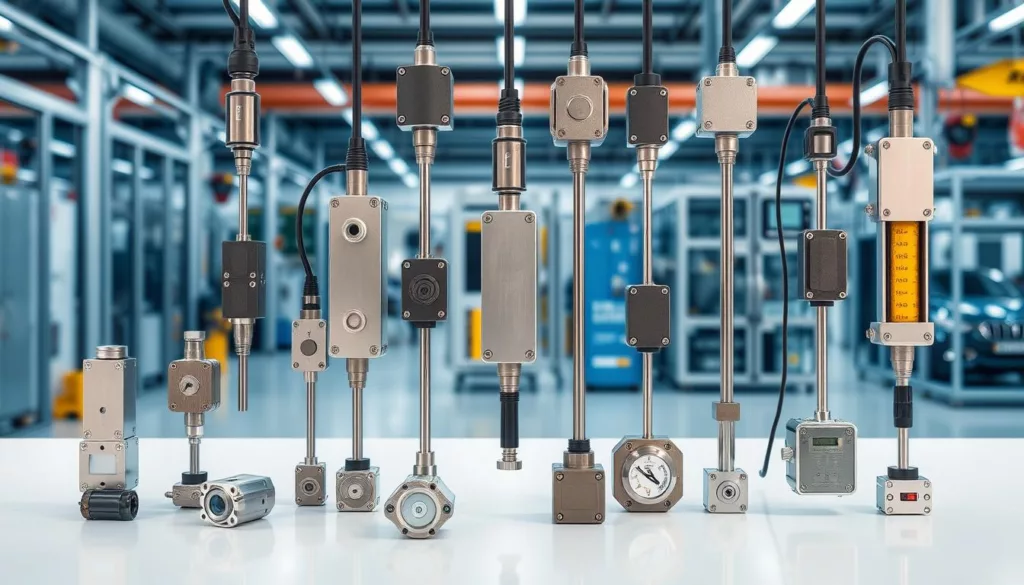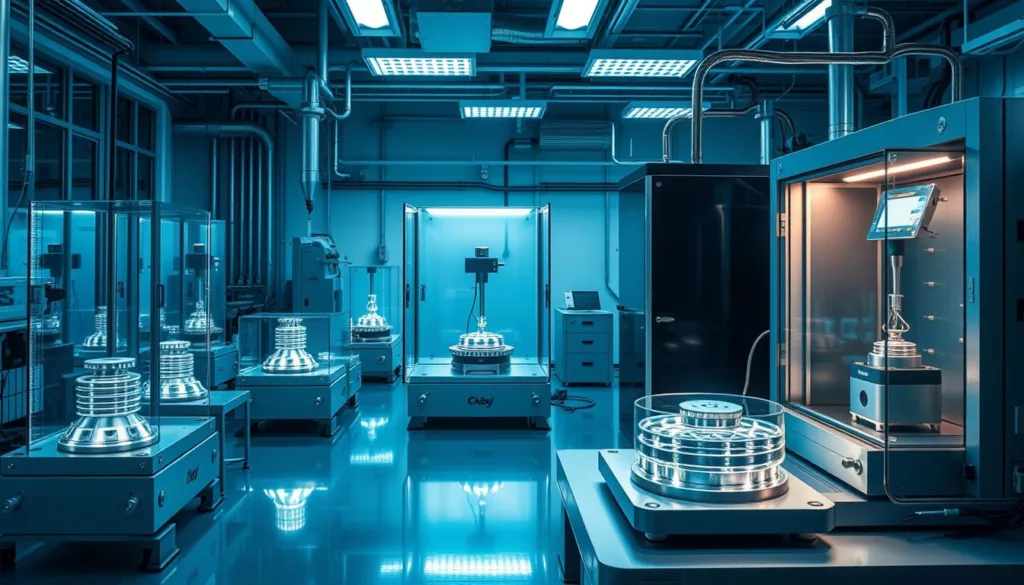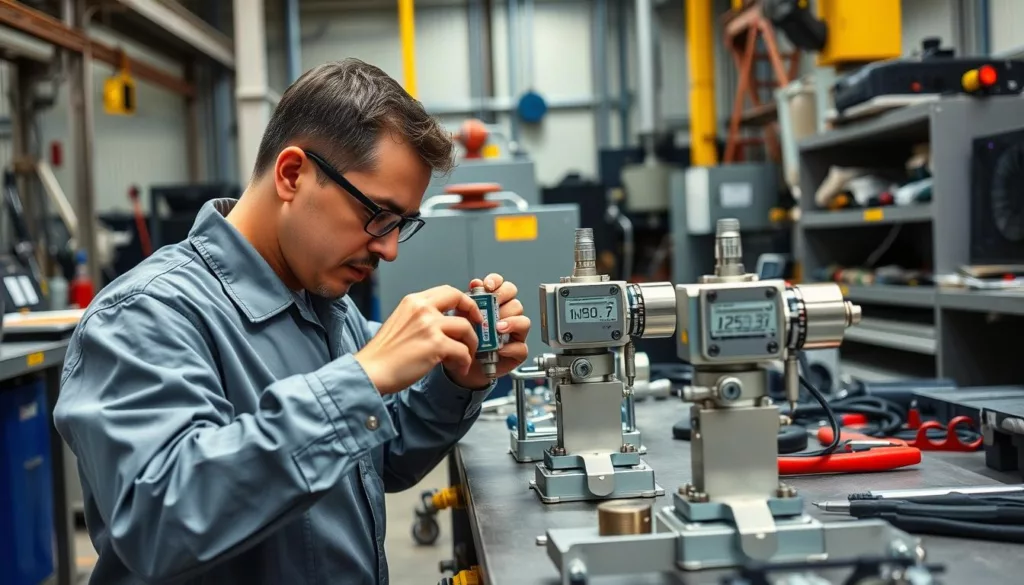In today’s fast world, industries need precision and tailored solutions. Load cells, key sensors, measure forces accurately. XJCSENSOR leads in providing innovative sensor solutions, including customizable load cells.
These load cells change how industries weigh and measure. They help businesses overcome the limits of standard solutions. XJCSENSOR’s team works with clients to create custom load cell designs for various sectors like aerospace and automotive.
Key Takeaways
- Customizable load cells from XJCSENSOR enable industries to address unique operational requirements with precision and reliability.
- The company’s team of experts collaborates with clients to develop tailored load cell solutions that integrate perfectly with specific applications.
- XJCSENSOR’s commitment to innovation and technical expertise ensures that organizations can optimize their industrial weighing and measurement needs.
- Custom load cell designs from XJCSENSOR provide enhanced accuracy, flexibility, and performance in diverse operating conditions.
- Businesses can leverage XJCSENSOR’s customization capabilities to gain a competitive edge and drive operational excellence in their respective industries.
Understanding Load Cells and Their Importance
Load cells are key in many industries, like industrial weighing and mechanical testing. They measure forces, weights, and other physical quantities with great accuracy. They turn mechanical force into an electrical signal, making tailored force measurement possible for many uses.
Definition of Load Cells
A load cell is a device that changes mechanical force into an electrical signal. This signal shows the force or weight applied. Load cells are made in different designs and materials. This makes them application-specific load cells for various needs.
How Load Cells Work
Load cells work by measuring strain. When force is applied, the load cell deforms slightly. Sensors inside detect this deformation and turn it into an electrical signal. The signal’s strength shows the force applied, making measurements accurate.
Applications of Load Cells
Bespoke sensors are vital for industries needing precise force measurement. Load cells are used in many fields, including:
- Industrial weighing and packaging
- Mechanical testing and equipment calibration
- Medical device manufacturing and pharmaceutical processing
- Automotive and aerospace engineering
- Agricultural and food processing equipment
Load cells’ versatility and customization options offer tailored solutions. They ensure accurate and reliable measurements in various conditions.
“Load cells are the backbone of precise force measurement, enabling innovative solutions across diverse industries.”
Customization Options for Load Cells
In the world of precision weighing systems, customization is key. XJCSENSOR offers a wide range of options to fit your needs. From specialized manufacturing to detailed customization, we have it all.
Load Cell Types
We have a variety of load cells to meet different needs. You can choose from strain gauge, piezoelectric, or magnetic load cells. Our team will find the best solution for you.
Materials and Designs
We also customize materials and designs. You can pick from aluminum to stainless steel, depending on your environment. Our innovative designs and mounting options make our systems versatile.
Calibration and Sensitivity
Accuracy is our top priority. Our experts can calibrate your load cells for optimal performance. This ensures your load cells work reliably.
“With XJCSENSOR’s customization expertise, we were able to develop a specialized force transducer solution that exceeded the performance of off-the-shelf products in our demanding aerospace application.”
XJCSENSOR’s customization helps customers in various industries. Whether you’re in aerospace, medical, or automotive, our solutions meet your unique needs.
Industries That Benefit from Custom Load Cells
In the world of load cell engineering, custom solutions are in high demand. Certain sectors need tailored load cell designs. XJCSENSOR has the expertise to deliver these solutions. Let’s look at three industries that greatly benefit from custom load cells.
Aerospace Industry
The aerospace industry faces tight tolerances and strict safety rules. Custom load cells for this sector must handle extreme conditions and offer high accuracy. They also need to meet tough certification standards.
XJCSENSOR works with aerospace makers to create specialized load cells. These load cells improve aircraft performance, safety, and maintenance.
Medical Device Manufacturing
In the medical field, precision is key. Custom load cells from XJCSENSOR help medical device makers improve their products’ quality and reliability. Our tailored solutions ensure consistent performance and meet strict regulations.
These solutions are vital for sensitive surgical tools and advanced prosthetics. They help improve patient outcomes.
Automotive Sector
The automotive industry needs innovative load cell technologies. XJCSENSOR engineers custom load cells for the latest in automotive manufacturing. This includes automated assembly lines and advanced safety features.
Our customizable load cell solutions help manufacturers boost production efficiency and product quality. They also make vehicles safer and more reliable.
Across these diverse industries, XJCSENSOR’s load cell engineering expertise empowers businesses. Our custom solutions help clients achieve better accuracy, flexibility, and performance. This unlocks the full operational capacity of their businesses.
The Process of Customizing Load Cells
At XJCSENSOR, we focus on creating custom load cell design solutions. We work closely with our clients to meet their specific needs. This ensures the industrial weighing solutions we provide are tailored to their exact requirements.
Initial Consultation and Requirements Gathering
We start by having a detailed initial consultation with our clients. We learn about their applications, performance needs, and any special challenges they face. This helps us understand their requirements fully.
Prototyping and Testing
With a clear understanding of what our clients need, our team designs a custom load cell prototype. We then test it thoroughly to make sure it meets the performance standards. Our advanced techniques help us optimize the design for accuracy and durability.
Final Implementation
Once the prototype passes testing, we help our clients implement the custom load cell design. We provide training, installation support, and maintenance services. This ensures the load cells work smoothly with their systems.
Our proven process at XJCSENSOR guarantees our clients get the custom load cell design they need. We’re dedicated to collaboration and technical excellence. This allows us to deliver industrial weighing solutions and tailored force measurement systems that meet and exceed their expectations.
Advantages of Customizable Load Cells
In the world of industrial sensors, making load cells fit specific needs is a big deal. At XJCSENSOR, we see how application-specific load cells and bespoke sensors help our clients in many fields. They offer better accuracy, precision, flexibility, and performance.
Enhanced Accuracy and Precision
We create specialized load cell manufacturing solutions to meet our clients’ exact needs. Our team works with customers to get their specific measurement needs. This way, we can adjust the load cell’s design, materials, and calibration for top accuracy.
Increased Flexibility for Applications
Customizable load cells are great because they fit many applications. Whether it’s aerospace, medical devices, or cars, we can adjust the load cell to fit their systems and processes.
Improved Performance in Varied Conditions
Load cells face tough environments with changing temperatures, vibrations, or corrosive elements. Our custom load cells are made to perform well in these conditions. They ensure reliable and consistent measurements, even in tough situations.
| Advantage | Description |
|---|---|
| Enhanced Accuracy and Precision | Customized design and calibration to meet specific measurement requirements |
| Increased Flexibility for Applications | Adaptable dimensions, mounting, and interfaces for diverse industry needs |
| Improved Performance in Varied Conditions | Optimized design to withstand challenging environmental factors |
By using application-specific load cells, bespoke sensors, and specialized load cell manufacturing, XJCSENSOR aims to provide tailored solutions. Our focus on technology and customer needs helps our clients succeed with confidence.
Load Cell Technologies and Innovations
The world of precision weighing systems is always changing. This is thanks to new advancements in load cell engineering. Innovations like strain gauge technology, wireless capabilities, and smart features are changing how industries use load cells.
Strain Gauge Technology
Strain gauge technology is a key part of modern load cells. It works by changing electrical resistance when force is applied. This technology has gotten better over time, making it more precise and sensitive for different uses.
Wireless Load Cells
Wireless load cells have made things easier and more flexible. They don’t need wires, making them easy to set up in many places. They also let you monitor and send data from anywhere, which is great for industries that need easy-to-use systems.
Smart Load Cells
Smart load cells have brought big changes to the industry. They have features like microprocessors, data analytics, and connectivity. This means you can monitor things in real-time, predict when you might need maintenance, and get detailed diagnostics. Smart load cells give users important information to make their systems work better.
As more industries need custom load cell solutions, these new technologies are helping. They make force transducer systems more efficient, reliable, and flexible. By using these innovations, industries can become more productive, accurate, and cost-effective.
Best Practices for Maintaining Load Cells
To keep your customizable load cells working well, you need to take good care of them. By following some key steps, you can make sure your load cells stay accurate and reliable. This helps save money in the long run.
Regular Calibration
Calibration is key to keeping your load cells accurate. Set up a regular schedule for calibration, which can be monthly or yearly. It depends on your specific needs. This keeps your custom load cell design working at its best.
Environmental Considerations
Load cells are affected by things like temperature, humidity, and vibration. It’s important to watch these factors closely. Keep your load cells away from extreme temperatures, too much moisture, and strong shocks or vibrations. This helps them last longer and work better.
Troubleshooting Common Issues
- Check your load cells often for any damage, like cracks or loose parts.
- Fix any problems right away to keep your industrial weighing solutions working right.
- If you’re not sure what to do, look at the manufacturer’s advice or get help from a pro.
By sticking to these tips, you can make your load cells last longer and work better. This means your industrial weighing solutions will stay accurate and cost-effective for a long time.
Case Studies: Success Stories of Custom Load Cells
At XJCSENSOR, we’re proud to share success stories from our tailored force measurement solutions. We’ve worked with clients in many industries. Together, we’ve created custom load cells and sensors that have made a big difference. Let’s look at three examples that show how our custom solutions can change things.
Aerospace Solutions
In the aerospace world, being precise and reliable is key. A top aircraft maker needed a special load cell to measure engine thrust. Our team designed a custom load cell that could handle extreme conditions and vibrations. This sensor helped improve engine performance and ensured safety in flight.
Medical Applications
The medical field needs innovative solutions that meet strict standards. A well-known medical equipment maker worked with us on a surgical robot. We created a custom sensor for precise force feedback. This has led to better patient care and more effective medical devices.
Industrial Automation
In industrial automation, reliable sensors are essential. A leading packaging equipment maker needed our help. We designed a custom solution for accurate weight and force measurement. This has improved product quality, efficiency, and reduced downtime, boosting the company’s market position.
These stories highlight the power of our tailored force measurement solutions. By working with XJCSENSOR, our clients have seen big improvements in performance and reliability. We’re dedicated to helping our customers succeed with our custom load cells and sensors.
Selecting the Right Manufacturer for Custom Load Cells
Finding the right partner for specialized load cell manufacturing is key. The success of your projects depends on the manufacturer’s expertise. Look for these factors when choosing a vendor.
Criteria for Choosing a Vendor
- Technical expertise: Choose a manufacturer with a strong track record in custom load cell design and manufacturing. They should have the right engineering knowledge and production skills for your needs.
- Quality assurance: Make sure the vendor has strict quality control measures. This includes thorough testing and calibration to ensure their products are accurate and reliable.
- Industry experience: Pick a manufacturer with lots of experience in your industry. This could be aerospace, medical, automotive, or another sector needing specialized load cells.
Importance of Local Support
Having a local presence and support network is very valuable for customized load cell solutions. A nearby manufacturer can offer faster service, more personal attention, and a better understanding of your local needs and regulations.
Evaluation of Manufacturer Capabilities
Check the manufacturer’s capabilities, like their design, prototyping, and production. See if they can handle design changes, customization, and unique requirements. Also, consider their ability to increase production as your needs expand.
By choosing the right specialized load cell manufacturing partner, you can ensure your projects succeed. They will deliver the accuracy, reliability, and performance your industry needs.
Future Trends in Load Cell Customization
The field of load cell engineering is changing fast. We’re seeing new ways to customize load cells for different needs. This is leading to big changes in how we work.
Smart Manufacturing Integration
Load cells are now part of smart manufacturing systems. They work with advanced automation to analyze data in real-time. This helps improve efficiency and quality in many industries.
Increased Demand for Automation
More industries want automated processes. Customizable load cells help make this happen. They offer the precision and reliability needed for automation.
Sustainability and Eco-Friendly Practices
Now, making load cells that are good for the environment is key. Manufacturers are using green materials and designs. They’re also working to reduce their impact on the planet.
The future of load cells looks bright. We’ll see more smart manufacturing, automation, and focus on being green. XJCSENSOR is leading the way, creating innovative solutions for our customers.
| Trend | Description | Benefits |
|---|---|---|
| Smart Manufacturing Integration | Load cells designed to integrate with advanced automation and control systems | Increased efficiency, productivity, and quality control |
| Increased Demand for Automation | Customizable load cells enabling advanced automation in various industries | Improved precision, reliability, and flexibility in automated processes |
| Sustainability and Eco-Friendly Practices | Load cell solutions developed with environmentally-friendly materials and production methods | Reduced carbon footprint and alignment with sustainability goals |
Cost Considerations for Custom Load Cell Solutions
Investing in custom load cell design is a big decision for industrial weighing solutions. But, the long-term benefits often make the initial cost worth it. Let’s look at the different pricing models, budgeting strategies, and the value of custom load cell solutions.
Pricing Models
The cost of custom load cell design depends on several things. These include the complexity of the application, how many units you need, and the materials used. Here are some common pricing models:
- Per-unit pricing: The cost is based on the number of custom load cells ordered.
- Tiered pricing: Volume discounts are offered for larger quantities, encouraging bulk purchases.
- Project-based pricing: The overall scope of the custom solution is factored into the final cost.
Budgeting for Custom Solutions
When budgeting for custom load cell design, think about the long-term benefits. The upfront cost might be higher than buying off-the-shelf. But, custom load cells offer better accuracy, precision, and performance. This can save you money in the long run. Consider these factors in your budget:
- Initial design and prototyping costs
- Ongoing maintenance and calibration expenses
- Potential for increased productivity and reduced downtime
- Improved quality control and reduced waste
Long-Term Value of Custom Load Cells
The real value of custom load cell design is in optimizing your industrial weighing solutions and tailored force measurement for your specific needs. By choosing a custom solution, you can expect:
- Enhanced accuracy and precision for critical applications
- Increased flexibility to adapt to changing requirements
- Improved performance in challenging environmental conditions
- Reduced maintenance and operational costs over the long run
Deciding to invest in custom load cell design should be based on a detailed analysis of your unique needs. This will help you see the long-term value it brings to your operations.
Conclusion: Optimizing Your Industry Needs with Custom Load Cells
Customizable load cells are a game-changer for industries looking for specific sensor technologies. By teaming up with specialized load cell makers, companies can get sensors that fit their exact needs. This leads to better precision, flexibility, and performance.
Recap of Key Benefits
Custom load cells bring many advantages. They offer better accuracy, more versatility, and work well in different environments. These tailored sensors help businesses avoid the problems of generic products. They open up new chances for creativity and better efficiency.
Final Thoughts on Customization Options
The choices for customizing load cells are vast. You can pick from various types and materials, and even adjust sensitivity and calibration. Working with skilled designers lets you create sensors that perfectly match your operations. This results in outstanding performance.
Encouragement to Seek Expert Help
If you need custom load cell solutions, look into XJCSENSOR——专注于知识共享、创新和技术专长。. Our team of experts will help you through the customization process. They ensure your specific needs are met with precision and creativity. Start optimizing your industry needs with custom load cells today.

